#Assassination of William McKinley
Text
GROVER CLEVELAND
•Grover Cleveland: A Study In Courage by Allan Nevins (BOOK)
•An Honest President: The Life and Presidencies of Grover Cleveland by H. Paul Jeffers (BOOK | AUDIO)
•A Secret Life: The Lies and Scandals of President Grover Cleveland by Charles Lachman (BOOK | KINDLE | AUDIO)
•A Man of Iron: The Turbulent Life and Improbable Presidency of Grover Cleveland by Troy Senik (BOOK | KINDLE | AUDIO)
BENJAMIN HARRISON
•Benjamin Harrison: Hoosier Warrior, 1833-1865 by Harry J. Sievers (BOOK)
•Benjamin Harrison: Hoosier Statesman, 1865-1888 by Harry J. Sievers (BOOK)
•Benjamin Harrison: Hoosier President, 1889-1893 by Harry J. Sievers (BOOK)
WILLIAM McKINLEY
•In the Days of McKinley by Margaret Leech (BOOK)
•President McKinley: Architect of the American Century by Robert W. Merry (BOOK | KINDLE)
•William McKinley and His America by H. Wayne Morgan (BOOK | KINDLE)
•The Triumph of William McKinley: Why the Election of 1896 Still Matters by Karl Rove (BOOK | KINDLE | AUDIO)
THEODORE ROOSEVELT
•The Rise of Theodore Roosevelt by Edmund Morris (BOOK | KINDLE | AUDIO)
•Theodore Rex by Edmund Morris (BOOK | KINDLE | AUDIO)
•Colonel Roosevelt by Edmund Morris (BOOK | KINDLE | AUDIO)
•Edmund Morris Trilogy
•The River of Doubt: Theodore Roosevelt's Darkest Journey by Candice Millard (BOOK | KINDLE | AUDIO)
•Mornings On Horseback: The Story of an Extraordinary Family, a Vanished Way of Life, and the Unique Child Who Became Theodore Roosevelt by David McCullough (BOOK | KINDLE | AUDIO)
•T.R.: The Last Romantic by H.W. Brands (BOOK | KINDLE | AUDIO)
WILLIAM HOWARD TAFT
•The Bully Pulpit: Theodore Roosevelt, William Howard Taft, and the Golden Age of Journalism by Doris Kearns Goodwin (BOOK | KINDLE | AUDIO)
•William Howard Taft: An Intimate History by Judith Icke Anderson (BOOK)
•Chief Executive to Chief Justice: Taft Betwixt the White House and Supreme Court by Lewis L. Gould (BOOK | KINDLE)
WOODROW WILSON
•Wilson by A. Scott Berg (BOOK | KINDLE | AUDIO)
•Woodrow Wilson: A Biography by John Milton Cooper Jr. (BOOK | KINDLE | AUDIO)
•When the Cheering Stopped: The Last Years of Woodrow Wilson by Gene Smith (BOOK | KINDLE)
•The Ordeal of Woodrow Wilson by Herbert Hoover (BOOK)
•The Moralist: Woodrow Wilson and the World He Made by Patricia O'Toole (BOOK | KINDLE | AUDIO)
WARREN G. HARDING
•The Shadow of Blooming Grove: Warren G. Harding in His Times by Francis Russell (BOOK)
•The Available Man: The Life Behind the Masks of Warren G. Harding by Andrew Sinclair (BOOK)
•1920: The Year of the Six Presidents by David Pietrusza (BOOK | KINDLE | AUDIO)
•The Ohio Gang: The World of Warren G. Harding by Charles L. Mee Jr. (BOOK | KINDLE)
CALVIN COOLIDGE
•Coolidge by Amity Shlaes (BOOK | KINDLE | AUDIO)
•The High Tide of American Conservatism: Davis, Coolidge, and the 1924 Election by Garland S. Tucker III (BOOK | KINDLE)
#Books#Book Suggestions#Book Recommendations#Books About Presidents#Presidents#Presidency#Presidents Books#Presidential Books#Grover Cleveland#President Cleveland#Cleveland Administration#Benjamin Harrison#President Harrison#Harrison Administration#William McKinley#President McKinley#McKinley Administration#Assassination of William McKinley#McKinley Assassination#Theodore Roosevelt#President Roosevelt#Roosevelt Administration#TR#William Howard Taft#President Taft#Taft Administration#Woodrow Wilson#President Wilson#Wilson Administration#Warren G. Harding
33 notes
·
View notes
Text
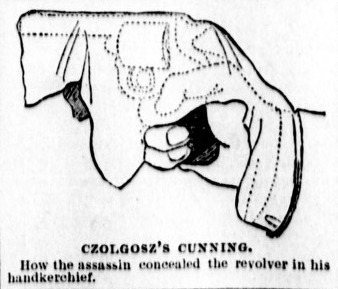
This is one of my favorite things about Leon Czolgosz and the news surrounding him. This newspaper called him "cunning" for the way he concealed his gun. How did he do it? He put a fucking handkerchief over it.
This newspaper called him cunning because he had the brilliant idea to put a fucking handkerchief over his gun
12 notes
·
View notes
Text
In celebration of the Ides of March, please enjoy an excerpt from my AU fic "The London Job," in which Five and Lila are partners at the Commission and must go around making history and building a body count.
Happy assassination day!
-----‐--------------------------------------------------------------------------
Being a temporal assassin isn’t for everyone.
In order to become a successful agent for the Temps Commission, one must be remarkably well-trained, adaptable, skilled, and morally bankrupt.
However, despite having to be highly qualified, agents are more often than not, thanklessly overworked, woefully underpaid, and literally required to take part in incredibly dangerous behaviors, up to and including, murder, mayhem, torture, sabotage, espionage, demolition, and blackmail, just to name a few; they also have to deal with the fact that they must do all of this, while constantly jet-lagged.
Now, for many agents, villainous behavior isn’t much of an issue. Most temporal assassins are fairly mercenary in their motivations; a weapon to be pointed and fired.
The issue is their primary mode of transportation.
Time travel is an exhausting activity, even via briefcase, both physically and mentally. Materially, time travel often results in such unpleasant side effects as full-body itching, migraines, brain fog, dizziness, poor blood circulation, and fatigue.
Psychologically, time travelers must be able to possess the mental fortitude required to seamlessly blend into their surroundings amidst countless people, cultural epochs, civilizations, and historical periods.
There’s also the fact that temporal assassins almost always die while in the line of duty, and work long uncomfortable hours, many of which don’t even count toward their contract periods. They travel constantly, never keeping still, which many professions require, but throw into the mix the mental dissonance of being a creature outside of time, and things become even more difficult. Many hit men and women find themselves losing track of where they are, when they are, and who they are.
It is a lonely existence being unmoored and unknown as they shift through the sands of time, and everywhere they turn is either an enemy or a target.
For Number Five, he did his job largely by eclipsing himself; withdrawing inwardly to the point he became something of a non-entity. Someone that was so unobtrusive and yet intimidating that one could barely recall seeing him even when one had interacted with him directly, and yet left a vague feeling of dread in all those he encountered.
Forgotten like a bad dream.
He managed the more unsavory aspects of the job by sheer force of will and practical compartmentalization. Number Five took no pleasure in his work, but could do what was needed to be done.
Lila did the opposite; she did her job by behaving like something of a chameleon of sorts, always able to shape and mold herself to fit the situation, always able to reflect what others expected or desired. Her charm was fairly universal but always artificial, her vivacity naturally infectious, but her interest largely feigned. Lila possessed true joie de vivre, but she faked almost all of her interactions with others and had little true investment in most people. They simply didn’t hold her attention for very long.
And as far as the less-than-pleasant aspects of the job were concerned, Lila was fairly unaffected. Although she didn’t relish the chaos that followed her as much as she used to, she didn’t exactly lose sleep over it either. More often than not, the only thing Lila regretted was having to see the toll the job took on her partner. Five wasn’t exactly a saint, but he was a far better person than Lila, and she pitied the idea of a good person having to do bad things. Her ability to lie, cheat, steal, torture, and murder was fostered by a lifetime of abuse, neglect, emotional manipulation, and an overall questionable upbringing.
Lila was made to be an assassin. Five wasn’t.
In many ways, this was what made the duo such a formidable force. They complemented each other perfectly, managing to succeed where many others would fail, even under extraordinary circumstances.
Superpowers helped too.
Because of their work as a team, incredible events throughout history were able to unfold.
Five had pulled the trigger that killed Archduke Franz Ferdinand of Austria, while Lila had ensured that their patsies, a group of Bosnian Serbs, were organized and fed information.
Poor impressionable Gavrilo Princip never would have gotten such an outlandish idea as an assassination attempt had it not been for the manipulation of a mysterious and bewitching transfer student.
Lila had stood amongst the crowd of 5,000 spectators on the day that William McKinley shook hands at the Pan-American Exposition in Buffalo, New York.
All eyes had fallen on anarchist Leon Czolgosz and the Iver-Johnson revolver he concealed in a handkerchief. No one ever suspected the charming young woman beside him, concealing the same gun in her clutch, when his gun failed to discharge properly. This, of course, was due to the fact that an old man who had sold it to him had tampered with it in the first place, and whose name and description Czolgosz could never seem to recall.
They had even stood amongst the throng of ancient Romans as the rabble had tried to tamp down their collective panic. Have you heard? The Senate just murdered the Dictator Perpetuo!
None of them ever knew that, in the midst of this crowd, an old man and a lovely young woman moved amongst them, concealing the still bloody murder weapons that had begun the violence.
The old man had seemed like such an eloquent speaker and a natural nominee for the senate at the time.
Oh, well.
#tua fanfic#tua au#five & lila#five hargreeves#lila pitts#ides of march#history#julius caesar#franz ferdinand#william mckinley#assassination
3 notes
·
View notes
Photo


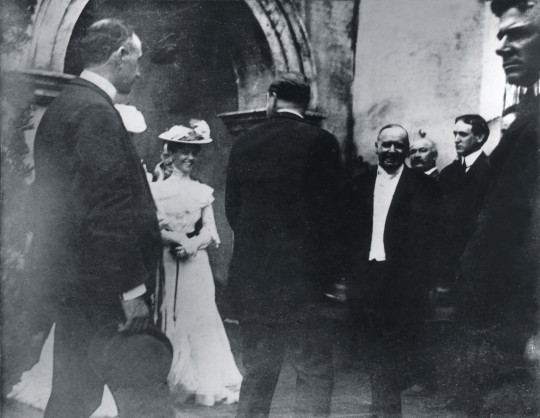


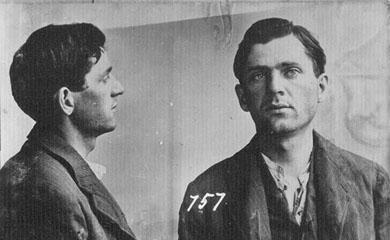
First photo of Leon F. Czolgosz after his shooting of US President William McKinley in 1901, photos illustrating the assassination attempt, as McKinley shook hands with the public at the Pan-American Exposition’s Temple of Music in Buffalo, New York, and Czolgosz’s booking photo. [1][2][3]
Though not directly fatal, the wound became gangrenous, and McKinley died a week later. The Exposition continued for another two weeks. Czolgosz was executed three weeks after it ended.
At the time, US Presidents lacked a regular security detail. “Though it still lacked any legislative mandate, by 1902, the Secret Service (a unit of the Treasury) was protecting President Theodore Roosevelt full-time. [...] In 1906, Congress passed legislation officially designating the Secret Service as the agency in charge of presidential security.” [4]
#leon f czolgosz#leon czolgosz#us history#history#assassination#secret service#1900s#william mckinley#prison#imprisonment#assassin#pan american expo#pan american exposition#temple of music#buffalo ny#world's fair#leslie's weekly
3 notes
·
View notes
Photo

Leon Czolgosz from history is beautiful
Requested by @antebellumbitch
#leon#leon czolgosz#assassins#assassin#history#historical assassin#leon assassin#william mckinley assassination#beautiful#beauty#Favorite#fave#faves#favs#fav#yourfav#yourfave#your fav#your fave#yourfaveisbeautiful#yourfavisbeautiful#your fav is beautiful#your fave is beautiful
3 notes
·
View notes
Text
still pissed that nobody has incorporated leon czolgosz's gun-concealing handkerchief into their met gala looks
#madi talks too much#like y'all the theme is america!! the assassination of william mckinley was a formative event in american history!!#plus it's the day after may day which helps drive the whole anarchism vibe home
7 notes
·
View notes
Text
I randomly remembered two things my old history teacher said about the McKinley assassination about three years ago:
“Leon Czolgosz was… kind of a weird dude.”
“McKinley developed gangrene from the bullet. DO NOT LOOK UP GANGRENE”
Also I ended up doing a project on the assassination and some kid broke my diorama :(
#leon czolgosz#William McKinley#assassins#that kid was my brother’s friend and I am still mad#but that teacher was awesome
1 note
·
View note
Text
broke: there is no mention of the 1901 Buffalo Pan-American Exposition in Crimson Peak because Del Toro didn't know that was a thing
woke: there is no mention of the 1901 Buffalo Pan-American Exposition in Crimson Peak because the characters are too wrapped up in their own lives to give a damn about it
which becomes even funnier when you recall that, oh yeah-
the President of the United States was fatally shot, at a massive highly publicized event, in the town where this movie takes place, smack-dab in the middle of the story's timeline (September 6, 1901- William McKinley died on September 14th and the disastrous dinner party is on October 21st, 1901 based on the dates in Carter's checkbook)
presidential assassination? fuck that; there's Gothic Drama afoot!
449 notes
·
View notes
Note
Sometimes I think about trying to build a quasi-mass movement to bomb the CEOs of the top 10 heaviest-polluting companies. What's easier, investing in around-the-clock security to protect yourself from a few thousand unconnected lone wolf Unabombers or making a few changes so that your company is now just the #11 top polluter? Maybe it could work. Maybe it's worth trying, at least. But I don't want to open that violent can of violent worms (but maybe I'm just a coward).
In the late 19th century and early 20th, many anarchists were obsessed with the idea of Propaganda of the Deed, the idea that by targeting industrialists and politicians and other high profile leaders for assassination, they could both paralyze the state and inspire the people to rise up in revolution. Notable deaths included Tsar Alexander II, Sadi Carnot, the Empress Elizabeth, and William McKinley. The total effect of these assassinations? Absolutely nothing. Bupkis.
Because large institutions aren’t led by video game bosses. They don’t collapse when the leader dies. The forces that produced them, and the people that maintain them, are still there! Propaganda of the Deed was a power fantasy masquerading as praxis (which becomes even more obvious when you see it eventually came to encompass random acts of terror bombing), and so is the fantasy that killing random CEOs—a job that exists mostly to ratify the decisions of others, a job that is in fact of notoriously difficult to define the utility of to a company—would somehow cleanse the world of greed as a motive.
There are a thousand ways to make the world a better place. Trying to be the Unabomber (who, if you will remember, had a terrible success rate bc mailing people bombs is a really silly way to try to kill them) is not one of them.
95 notes
·
View notes
Note
Thanks for the book recommendations. I’ve been getting curious about the McKinley assassination, and wondering which of the books would have best focus on that, especially the anarchist assassin’s story. It’s funny a few of the Garfield books reference his assassination in the title but hard to tell which of the McKinley books get into his murder’s cultural significance
Here are three good books that might be what you're looking for:
The President and the Assassin: McKinley, Terror, and Empire at the Dawn of the American Century by Scott Miller (BOOK | KINDLE | AUDIO)
Murdering McKinley: The Making of Theodore Roosevelt's America by Eric Rauchway (BOOK | KINDLE)
The Electrifying Fall of Rainbow City: Spectacle and Assassination at the 1901 World's Fair by Margaret Creighton (BOOK | KINDLE | AUDIO)
#History#Books#Book Suggestions#Book Recommendations#William McKinley#President McKinley#Assassination of William McKinley#McKinley Assassination#Leon Czolgosz#The President and the Assassin#Scott Miller#Murdering McKinley: The Making of Theodore Roosevelt's America#Murdering McKinley#Eric Rauchway#The Electrifying Fall of Rainbow City#Margaret Creighton#The Electrifying Fall of Rainbow City: Spectacle and Assassination at the 1901 World's Fair#Presidents#Presidential History#Presidential Assassinations#Pan-American Exposition
19 notes
·
View notes
Text
Out Representative-elect Robert Garcia (D-CA) may not have been able to get sworn in yesterday due to Republicans’ inability to elect a Speaker of the House, but he has plans for when he finally can be sworn in.
When he takes his oath of office, he’ll swear on a copy of the Constitution, and, beneath that, an original Superman #1 comic from 1939, a photo of his parents, and a copy of his citizenship certificate.
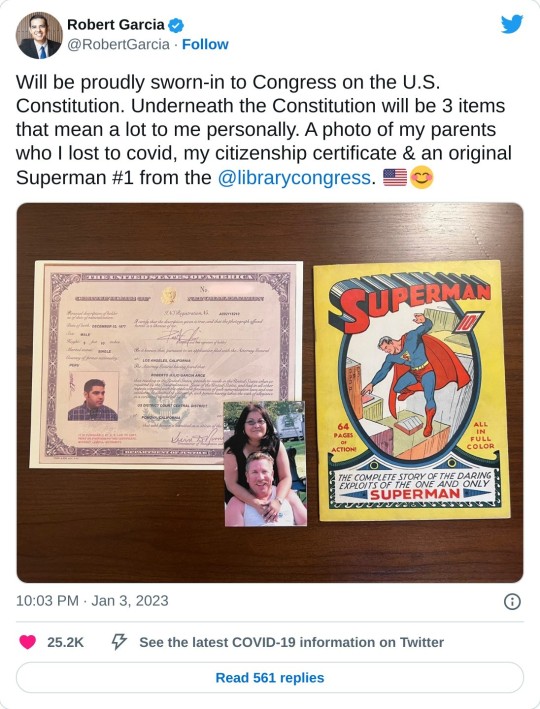
Garcia came to the U.S. from Peru with his family when he was five-years-old and has said that naturalization was “his proudest moment” and the reason he started a career in politics. His parents died in 2020 of COVID-19.
He was the youngest and first out LGBTQ+ person elected as mayor of Long Beach, California (a position he served in from 2014 to 2022). During his time as mayor, he worked with businesses to reduce their environmental impacts, filled vacancies on citizen commissions with diverse and female members, and worked to improve local infrastructure as well as financial opportunities for local artists and home-based business owners.
He’s also an avid comic book fan.
In November, he tweeted a photo of the Superman #1 comic along with Amazing Fantasy #15, in which Spider-Man first appeared, saying he didn’t know which one he would first check out from the Library of Congress.
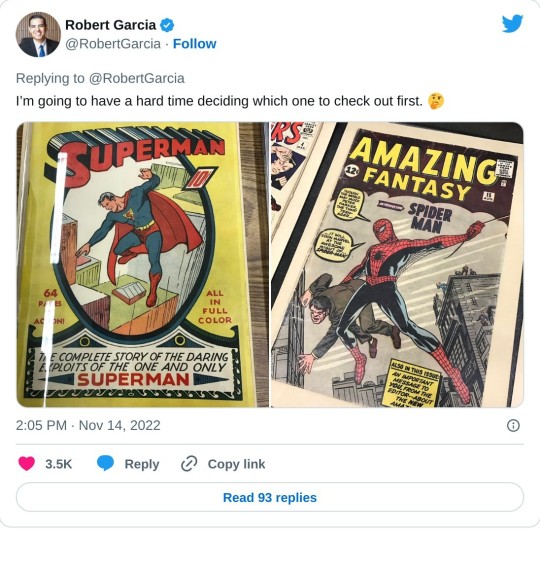
While many members of Congress will be sworn in on Bibles, they are not legally required to do so. Former Rep. – and current Minnesota attorney general – Keith Ellison (D-MN), who was the first Muslim person elected to Congress in 2007, was sworn in on a copy of the Quran owned by Thomas Jefferson.
Theodore Roosevelt wasn’t sworn in with any object after the assassination of William McKinley in 1901. And in 2014 Suzi LeVine was sworn in as U.S. ambassador to Switzerland and Liechtenstein on a Kindle with a copy of the Constitution open.
“I wanted to use a copy that is from the twenty-first century and that reflects my passion for technology and my hope for the future,” she said at the time.
New members of the House can’t be sworn in until a speaker is elected. Yesterday, after three votes, no candidate for Speaker was able to get a majority of votes because of a faction of Republicans voting against Rep. Kevin McCarthy (R-CA). The Democrats’ candidate – Rep. Hakeem Jeffries (D-NY) – got the most votes in each round of voting, and around 20 Republicans – including anti-LGBTQ+ Reps. Paul Gosar (R-AZ), Lauren Boebert (R-CO), Bob Good (R-VA), and Matt Gaetz (R-FL) – voted for Rep. Jim Jordan (R-OH).
Jordan himself nominated and voted for McCarthy.
The House adjourned without a new Speaker elected.
#us politics#news#2023#twitter#tweet#Democrats#lgbtq nation#robert garcia#us house of representatives#118th congress#detective comics#us constitution#library of congress#lgbtqia+#lgbtqia+ representation#lgbtqia+ pride#us history#President Theodore Roosevelt#Suzi LeVine#Keith Ellison#superman#California
512 notes
·
View notes
Text
Robert Todd Lincoln, Abraham Lincoln’s oldest son, was Garfield’s Secretary of War. He saw Guiteau shoot Garfield and was therefore one of the few men closely associated with the first two assassinations of U.S. presidents. Twenty years later, Lincoln was attending the Pan-American Exposition in Buffalo, New York when Leon Czolgosz assassinated President William McKinley in September 1901.
Via https://danieldrezner.substack.com/p/the-21st-century-destiny-of-the-republic
30 notes
·
View notes
Text
hey so the choir kids died on september 14 the same day that president william mckinley was shot and killed by second generation polish immigrant leon czolgosz in buffalo, michigan and that means that assassins the musical and ride the cyclone are both in the same universe. in this essay i will
27 notes
·
View notes
Text
''assassinated presidents yaoi this. assassinated presidents yaoi that. JFK this lincoln that'' well what about
JAMES GARFIELD
OR WILLIAM MCKINLEY

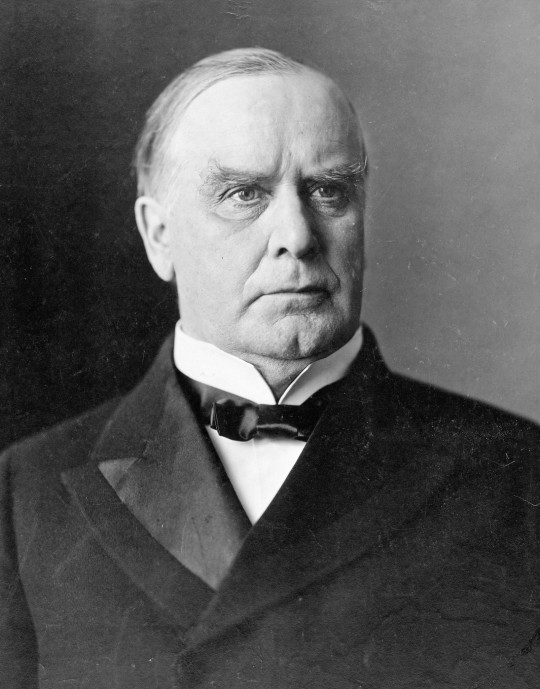
look at that stare. could you really forget them?

#shitpost#clone high#us presidents#history#politics#james garfield#william mckinley#abraham lincoln#john f kennedy#ok thats enough tags
26 notes
·
View notes
Quote
Robert Todd Lincoln, Abraham Lincoln’s oldest son, was Garfield’s Secretary of War. He saw Guiteau shoot Garfield and was therefore one of the few men closely associated with the first two assassinations of U.S. presidents. Twenty years later, Lincoln was attending the Pan-American Exposition in Buffalo, New York when Leon Czolgosz assassinated President William McKinley in September 1901.
The 21st Century Destiny of the Republic
21 notes
·
View notes
Text
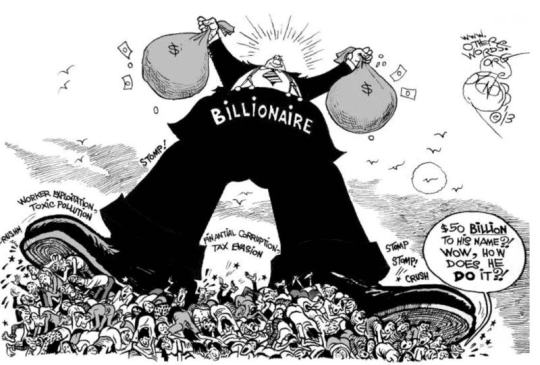
The real choice isn’t “pragmatism” or “idealism.” It’s either allowing these trends to worsen – destroying what’s left of our democracy and turning our economy into even more of a playground for big corporations, Wall Street, and billionaires – or reversing them. And the only pragmatic way of reversing them is through a “political revolution” that mobilizes millions of Americans.
Robert Reich (via azspot)
+
LETTERS FROM AN AMERICAN
HEATHER COX RICHARDSON
MAR 2, 2024
On February 25, 1901, financier J. P. Morgan’s men filed the paperwork to incorporate a new iron and steel trust, and over the weekend, businessmen waited to see what was coming. Five days later, on March 2, the announcement came: J. P. Morgan was overseeing the combination of companies that produced two thirds of the nation’s steel into the United States Steel Corporation. It was capitalized at $1.4 billion, which at the time was almost three times more than the federal government’s annual budget.
While the stock market was abuzz with news of the nation’s first billion-dollar corporation, Vice President–elect Theodore Roosevelt was on his way from New York to Washington, D.C., where he and his family arrived at 5:00 in the evening. The train was an hour behind schedule because the crowds coming to see the upcoming inauguration, scheduled for Monday, March 4, 1901, had slowed travel into Washington.
Two days later, President William McKinley took the oath of office for the second time, and Roosevelt became vice president.
McKinley was a champion of big business and believed the role of government was to support industry, dismissing growing demands from workers, farmers, and entrepreneurs for the government to level the economic playing field that had tilted so extraordinarily toward a few industry leaders. McKinley had won the hard-fought election of 1896 handily, but by 1900, Republicans were so concerned about the growing demand for reform that party leaders put Roosevelt, who had won a reputation for standing up to business interests, on the ticket, at least in part because they hoped to silence him there.
Roosevelt hoped he could promote reform from the vice presidency, but he quickly discovered that he couldn’t accomplish much of anything. His only official duty was to preside over the Senate, which would not convene until December. He was so bored he asked the chief justice of the Supreme Court if it would be unseemly for him to enroll in law school to finish his degree. (Horrified, the justice offered to supervise Roosevelt’s studies himself.)
But then, in September, an unemployed steelworker assassinated McKinley, and Roosevelt became president. “I told McKinley it was a mistake to nominate that wild man at Philadelphia,” one of McKinley’s aides said. “I told him what would happen if he should die. Now look. That damned cowboy is president of the United States.”
Two months later, on November 13, J. P. Morgan and railroad magnates brought together the nation’s main railroad interests, which had been warring with each other, into a new conglomerate called the Northern Securities Company. Even the staunchly big business Chicago Tribune was taken aback: “Never have interests so enormous been brought under one management,” its editor wrote.
Midwestern governors, whose constituents depended on the railroads to get their crops to market, suggested that their legislatures would find a way to prohibit such a powerful combination. Northern Securities Company officials retorted that they would simply keep all business transactions and operations secret. When Roosevelt gave his first message to Congress in December, industrialists watched to see what the “damned cowboy” would say about their power over the government.
They were relieved. Roosevelt said the government should start cleaning up factories and limiting the working hours of women and children, and that it should reserve natural resources for everyone rather than allow them to be exploited by greedy businessmen.
But Roosevelt did not oppose the new huge combinations. He simply wanted the government to supervise and control corporate combinations, preventing criminality in the business world as it did in the streets. He asked businessmen only for transparency. Once the government actually knew what businesses were up to, he said, it could consider regulation or taxation to protect the public interest.
Senators and businessmen who had worried that the cowboy president would slash at the trusts breathed a sigh of relief that all he wanted was “transparency.” According to the Chicago Tribune, the “grave and reverend and somewhat plutocratic Senators immediately admitted in the most delighted fashion that the young and supposedly impetuous President had discussed the trust question with rare discrimination.”
But they were wrong to think Roosevelt did not intend to reduce the power of big business. In early January 1902, Minnesota sued to stop the Northern Securities Company from organizing on the grounds that such a combination violated Minnesota law. While the Supreme Court dithered over whether or not it could rule on the case, the Roosevelt administration put the federal government out in front of the issue. In February, Roosevelt’s attorney general told newspapers that the administration believed the formation of the Northern Securities Company violated the 1890 Sherman Antitrust Act and that he would be filing a suit to keep it from organizing.
Businessmen were aghast, not only because Roosevelt was going after a business combination but also because he had acted without consulting Wall Street. When J. P. Morgan complained that he had not been informed, Roosevelt coolly told him that that was the whole point. “If we have done anything wrong,” said the astonished Morgan, “send your man [the attorney general] to my man [one of his lawyers] and they can fix it up.” The president declined. “We don’t want to fix it up,” explained the attorney general. “We want to stop it.”
“Criticism of President Roosevelt’s action was heard on every side,” reported the Boston Globe. “Some of the principal financiers said he had dealt a serious blow to the financial securities of the country.” For his part, Roosevelt was unconcerned by the criticism. “If the law has not been violated,” he announced, “no harm can come from the proposed legal action.”
In late February, the Supreme Court decided it would not hear the Minnesota case; on March 10, the United States sued to stop the organization of the Northern Securities Company.
In August 1902, Roosevelt toured New England and the Midwest to rally support for his attack on the Northern Securities Company. He told audiences that he was not trying to destroy corporations but rather wanted to make them act in the public interest. He demanded a “square deal” for everyone. As the Boston Globe put it: “‘Justice for all alike—a square deal for every man, great or small, rich or poor,’ is the Roosevelt ideal to be attained by the framing and the administration of the law. And he would tell you that that means Mr Morgan and Mr Rockefeller [sic] as well as the poor fellow who cannot pay his rent.”
In 1904 the Supreme Court ruled that the Northern Securities Company was an illegal monopoly and that it must be dissolved, and by 1912, Roosevelt had come to believe that a strong federal government was the only way for citizens to maintain control over corporations, which he saw as the inevitable outcome of the industrial economy. He had no patience for those who hoped to stop such combinations by passing laws against them. Instead, he believed the American people must create a strong federal government that could exert public control over corporations.
In a famous speech at Osawatomie, Kansas, in 1912, he called for a “new nationalism.”
“The citizens of the United States must effectively control the mighty commercial forces which they have called into being,” he said. He warned that “[t]here can be no effective control of corporations while their political activity remains…. We must have complete and effective publicity of corporate affairs, so that the people may know…whether the corporations obey the law and whether their management entitles them to the confidence of the public.”
Roosevelt had come to believe that a strong government must regulate business. “The absence of effective State, and, especially, national, restraint upon unfair money-getting has tended to create a small class of enormously wealthy and economically powerful men, whose chief object is to hold and increase their power,” he said.
After all, he said, “[t]he object of government is the welfare of the people.”
LETTERS FROM AN AMERICAN
HEATHER COX RICHARDSON
#Heather Cox Richardson#letters From an American#history#T.Roosevelt#bllionaires#corporate greed#income inequality#democracy#political influence#American History#Robert Reich#the purchase of the SCOTUS#welfare of the people
13 notes
·
View notes